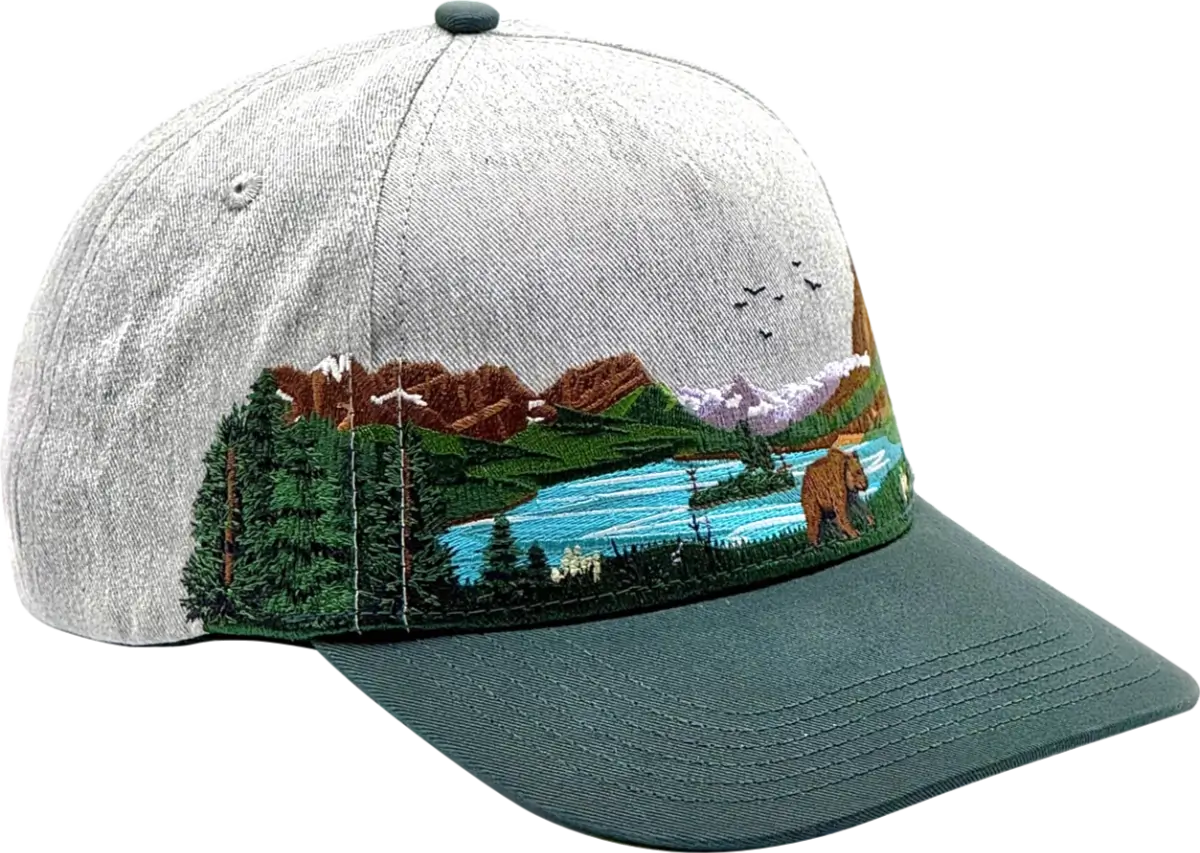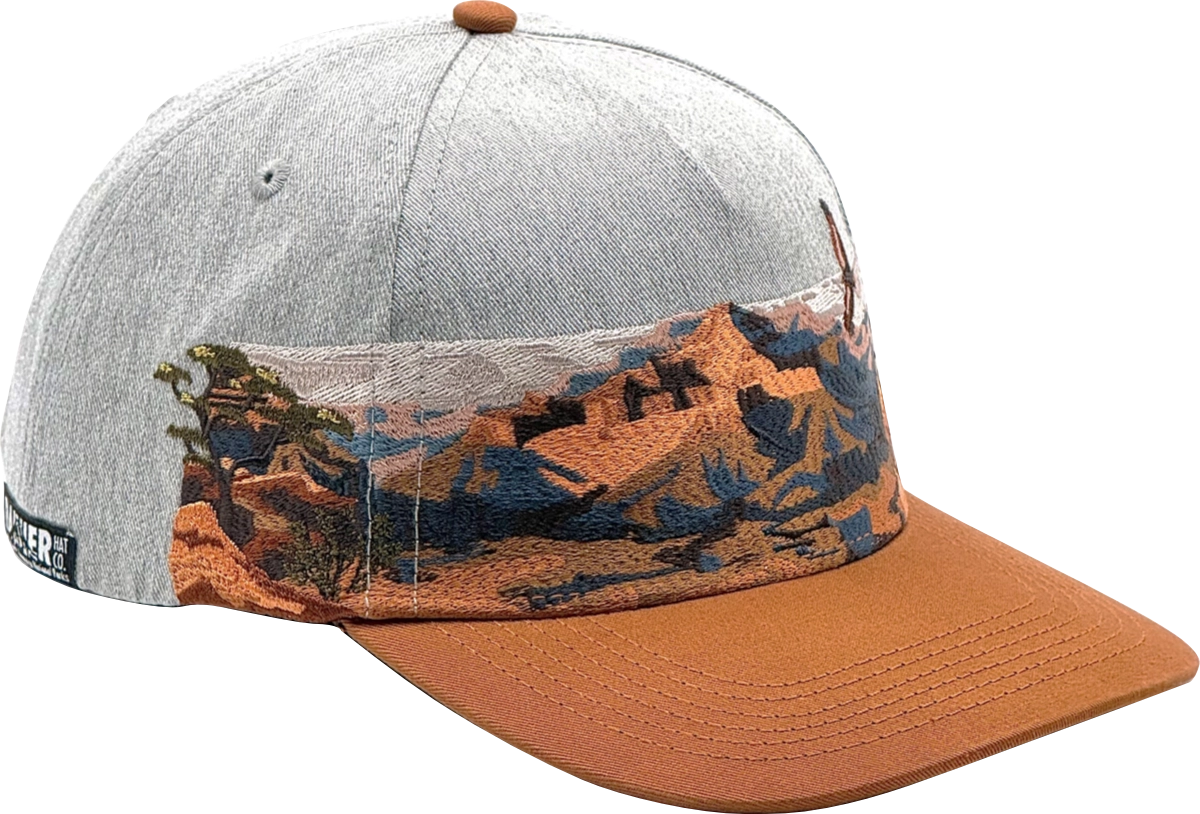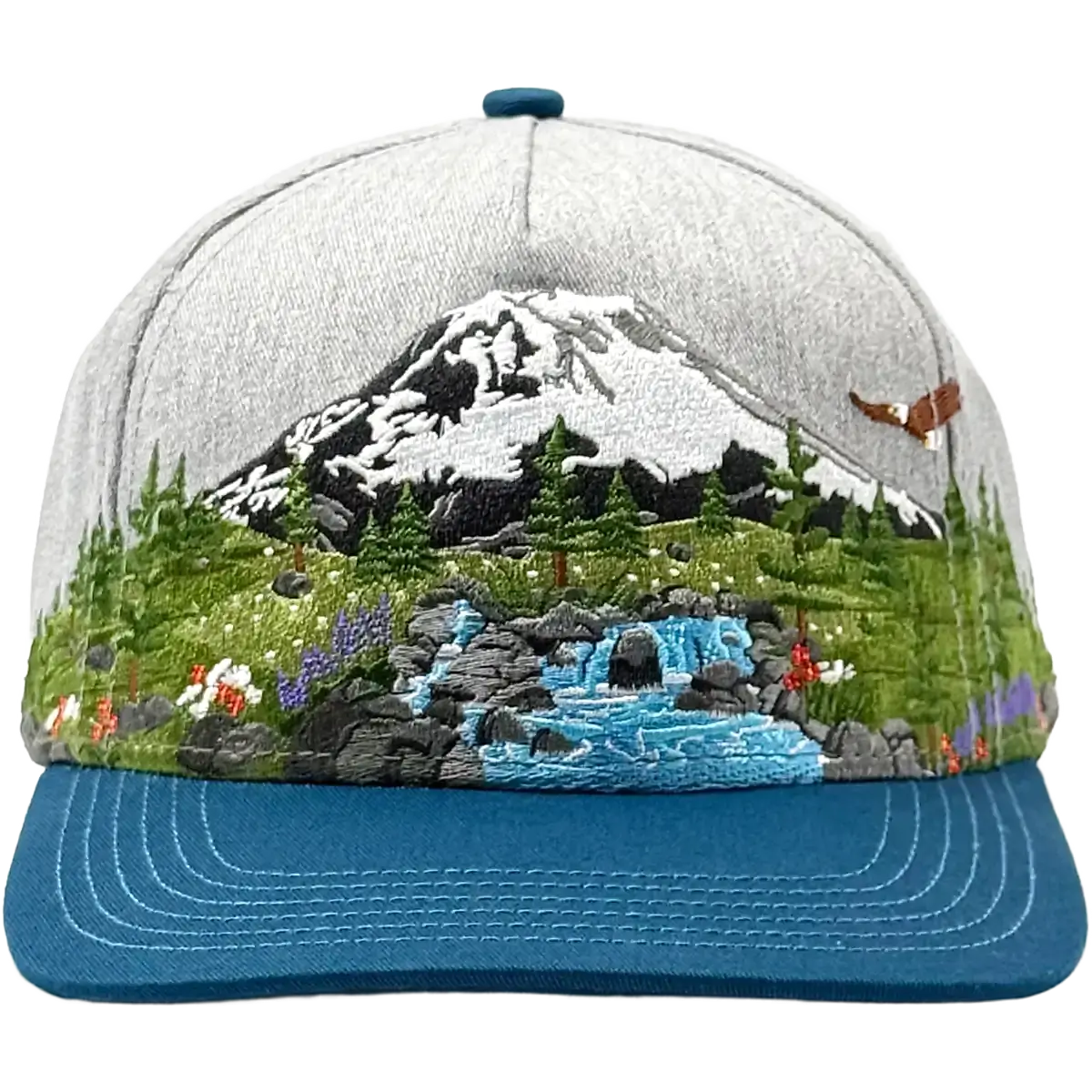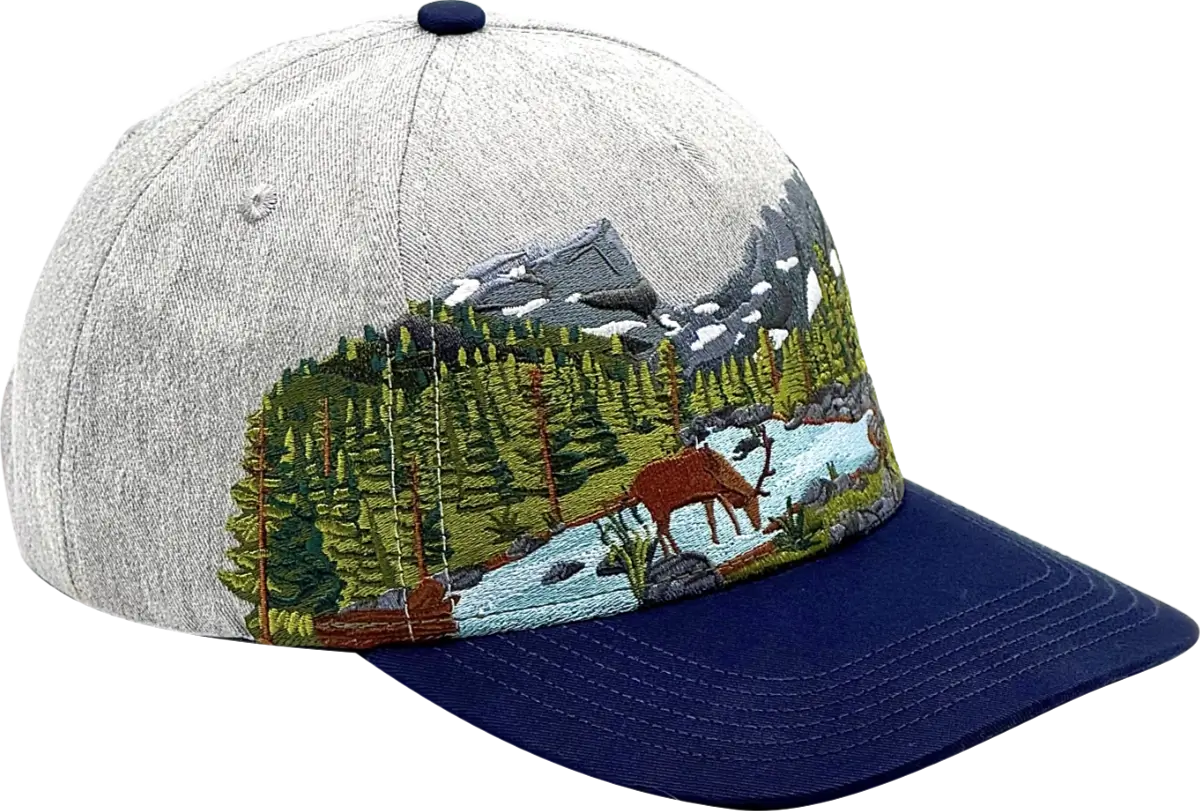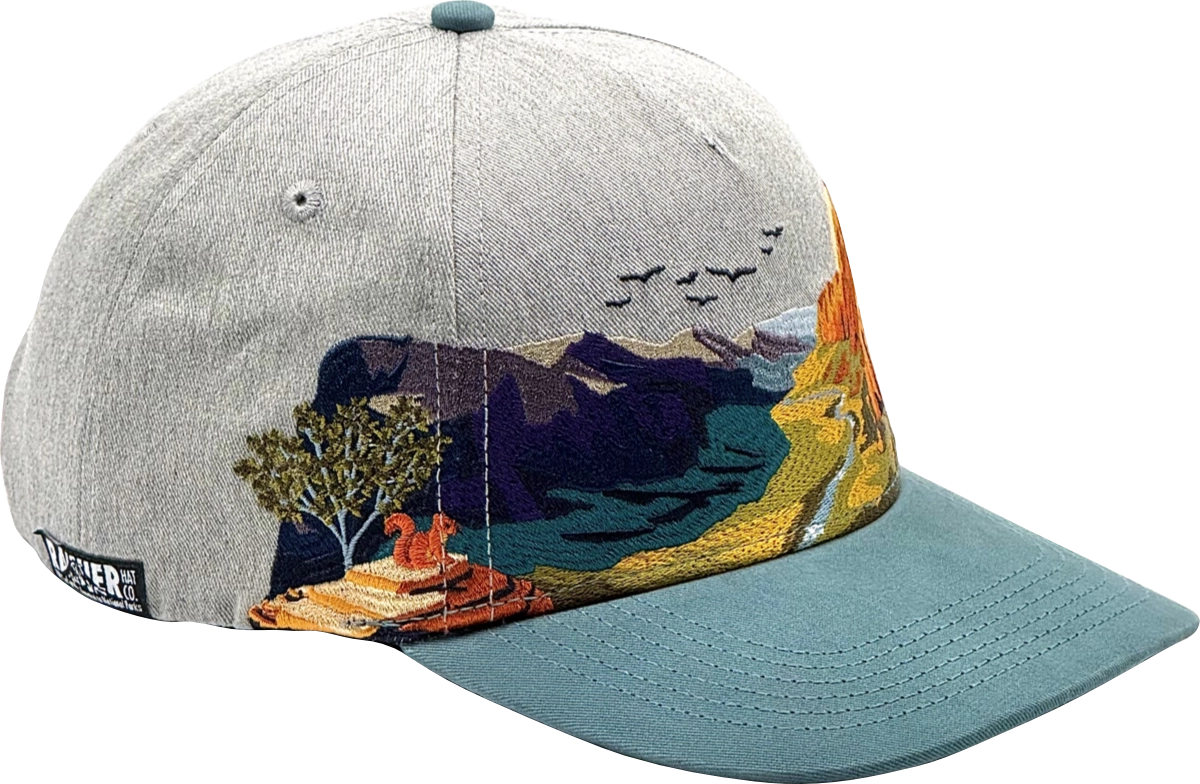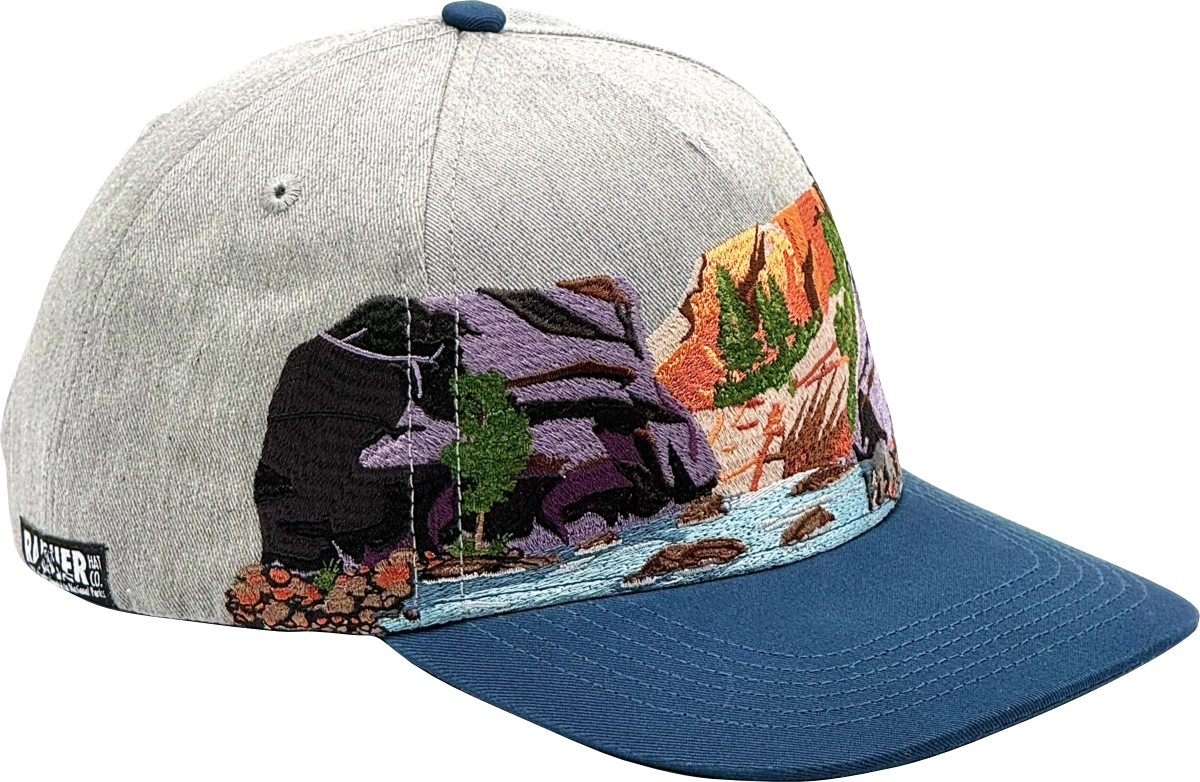Yosemite
National Park Hat
Details
- Embroidered panoramic design
- Adjustable snapback hat
- Structured mid-profile 5 panel
- Cotton, handwash
- Free shipping, free returns
- 100% of profits donated to National Parks
More National Parks
Our Mission
I'm Ian - from Seattle, and at Rainier Hat Co. we're dedicated to giving back to the places that inspire us every day. From the glaciers of Mount Rainier to the grand prismatic springs of Yellowstone, our national parks are treasures that deserve our support.
That's why we've made a commitment that goes beyond the norm: donating all our profits to these natural sanctuaries. It's not just about creating high-quality (and awesome) hats inspired by the beauty of the outdoors, it's about contributing to the preservation of these areas for future generations to enjoy.
Yosemite National Park Hat Inspiration
From across Housekeeping Beach, deep in Yosemite Valley and a popular spot for capturing this classic Yosemite landscape, you can find the inspiration for this Yosemite National Park Hat — the iconic, granite Half Dome rising up over the Merced River, fed by melting snow from the surrounding Sierra Nevada mountains and serving as a vital lifeline for the park's flora and fauna.
In the foreground a black bear (which can very often be more brown than black) and her cubs are exploring the meadow surrounded by towering evergreen trees — a mix of ponderosa pines, incense cedars, and white firs frame the valley and provide shelter and food for numerous bird and mammal species.
Design Process
Creating these National Park hats with their panoramic embroidery is a detailed process going beyond simply buying and reselling bulk designs.
The first step is a deep dive into what makes each park unique. From the Bison of Yellowstone and the Roseated Spoonbills of the Everglades to the panoramic views of Angels Landing in Zion, our goal is to highlight the beauty of each park. We try to find a specific viewpoint in the park to show off and what we need to do to capture the feeling of being there. While sometimes we ad-lib a bit of the design to include other elements to capture the feeling of the park as a whole, we try hard to find an actual place in the park you can visit even giving you an exact Google maps QR code with every hat.
Then we get to designing! Embroidery is naturally limited in colors and we use a 15 color (the most you'll find) edgeless embroidery process which takes upwards of 90 minutes and over 60,000 stitches per hat, but allows us to show off every detail from that epic mountain range to the colorful flowers in your favorite park.
Finally the design get digitized for embroidery, a sample is made for any final tweaks, and we go to production getting these fantastic hats on your heads.
And 100% of our profits are donated right back to our National Parks .
Visit the Inspiration
To reach the viewpoint of Half Dome park in the day-use area at Yosemite Village. From the parking area walk east along the pedestrian pathway toward the Merced River. The path leads to a riverside area approximately a quarter mile from the parking lot.
Once you reach the riverbank, face east across the Merced River toward Housekeeping Beach and you'll see Half Dome rising in the distance with the Merced River flowing in the foreground and Housekeeping Beach visible on the opposite shore.
This easily accessible viewpoint is available year-round and requires minimal walking from the parking area. The pathway is mostly flat and suitable for visitors of all abilities. The Yosemite Village area offers amenities including restrooms, a store, and visitor information.
For optimal viewing conditions, visit in early morning when the light illuminates Half Dome, or in late afternoon when the setting sun casts a golden glow on the face of the dome. During spring, higher water levels in the Merced River can enhance the scene with reflections of Half Dome and the surrounding landscape.
Yosemite National Park
Yosemite National Park, located in California's Sierra Nevada mountains, is a land of stunning natural beauty and grandeur. Famous for its dramatic waterfalls, towering sequoia groves, and iconic granite cliffs like Half Dome and El Capitan, Yosemite's 748,436 acres of wilderness offer endless opportunities for exploration and adventure.
Yosemite Valley forms the heart of the park. This glacially-carved valley is known for the soaring 2,425-foot Yosemite Falls, the tallest waterfall in North America. The Merced River meanders peacefully through meadows and forests on the valley floor. Majestic cliffs and rock formations rise thousands of feet above on all sides, evidence of the powerful geological forces that shaped this landscape over millions of years.
The park protects five distinct vegetation zones ranging from oak woodlands to alpine meadows near treeline. It provides crucial habitat for over 250 bird species and 80 mammal species including black bears, mule deer, bighorn sheep, and the rare Sierra Nevada red fox. The giant sequoia groves are home to some of the largest and oldest trees on Earth, like the Grizzly Giant estimated to be 2,700 years old.
Yosemite has captivated artists, writers, and photographers since the 19th century. Naturalist John Muir called it "by far the grandest of all the special temples of Nature I was ever permitted to enter" and Ansel Adams' iconic black-and-white photographs captured Yosemite's beauty and helped inspire its protection. Today, over 4 million visitors come each year to marvel at its wonders.
With 800 miles of hiking trails, hundreds of campsites and picnic areas, and opportunities for climbing, horseback riding, fishing and more, Yosemite offers a lifetime of adventure. From a scenic drive through the valley to a challenging backcountry trek, the park invites you to experience its timeless natural beauty and find your own connection to the wilderness. Plan ahead for reservations, come prepared for the weather and wildlife, and always put safety first to have an unforgettable Yosemite visit.
Most Popular Hikes
Half Dome
A strenuous hike that takes you to the summit of Yosemite's most famous granite dome. The trail involves a challenging ascent with the final 400 feet aided by cables to reach the top. Hikers are rewarded with sweeping panoramic views of Yosemite Valley, the High Sierra, and beyond.
Vernal and Nevada Falls
A popular hike that leads to the stunning Vernal and Nevada Falls. The trail's name comes from the mist created by the waterfalls, which can soak hikers during peak flow. Granite steps and scenic views make this a memorable and invigorating trek.
Glacier Point
This trail offers a challenging climb from Yosemite Valley to the breathtaking viewpoint at Glacier Point. Hikers are treated to spectacular views of landmarks such as Half Dome, Yosemite Falls, and the high country along the way. The reward at the top is one of the best panoramas in Yosemite National Park.
Yosemite Falls
This trail takes you to the top of North America's tallest waterfall. The steep and rocky trail provides stunning vistas of the valley and the cascading waters of Upper Yosemite Fall. The strenuous hike culminates in awe-inspiring views from the summit.
Cathedral Lakes
This hike leads to the picturesque Cathedral Lakes, nestled among granite peaks and serene alpine meadows. The trail is part of the famous John Muir Trail, offering hikers a taste of the High Sierra's beauty. The lakes are perfect spots for a peaceful rest or a picnic while soaking in the natural splendor.
Half Dome
One of the most iconic rock formations in Yosemite National Park, Half Dome is a granite monolith that rises nearly 5,000 feet above the valley floor. Its distinctive shape has made it a symbol of the park and a bucket-list destination for hikers and climbers from around the world.
The most popular way to reach the summit of Half Dome is via the Half Dome Trail. This challenging hike covers approximately 16 miles round trip and includes a steep ascent up the Subdome, a series of switchbacks known as the "cables," and a final scramble to the summit. The reward for your efforts is a breathtaking 360-degree view of the surrounding wilderness, including the valley below, the High Sierra peaks in the distance, and the meandering Merced River.
Due to the trail's difficulty and the need for a permit to ascend the cables, hiking Half Dome is not for the faint of heart. However, for those who are up to the challenge, the experience is unforgettable and offers a unique perspective on the beauty and grandeur of Yosemite National Park.
Yosemite Valley
Yosemite Valley is the heart of Yosemite National Park, a glacially carved canyon that is home to some of the park's most iconic landmarks. Surrounded by towering granite cliffs, lush meadows, and cascading waterfalls, the valley is a haven for outdoor enthusiasts and nature lovers alike.
One of the most famous features of Yosemite Valley is Yosemite Falls, one of the tallest waterfalls in North America. The falls consist of three separate sections: Upper Yosemite Fall, Middle Cascades, and Lower Yosemite Fall. The best time to see the falls at their peak is in the spring when the snowmelt swells the Merced River and sends torrents of water over the cliffs.
Another must-see attraction in Yosemite Valley is El Capitan, a massive granite monolith that rises more than 3,000 feet above the valley floor. El Capitan is a favorite destination for rock climbers, who come from around the world to test their skills on its vertical face.
Whether you're hiking to the top of Half Dome, picnicking in Cook's Meadow, or simply taking in the views from Tunnel View, Yosemite Valley offers a wealth of opportunities to explore and enjoy the natural beauty of Yosemite National Park.
El Capitan
Rising more than 3,000 feet above the valley floor, El Capitan is the other most famous rock formation in Yosemite National Park. This sheer granite monolith is a favorite destination for rock climbers, who come from around the world to test their skills on its vertical face.
One of the most popular climbing routes on El Capitan is the Nose, a challenging line that follows a prominent feature up the center of the formation. Climbers typically spend several days on the wall, hauling gear, setting up camps, and working their way up the route using a combination of free climbing and aid climbing techniques.
For those who prefer to keep their feet on the ground, El Capitan offers plenty of opportunities for viewing and photography. The meadows near El Capitan are a great place to watch climbers in action, especially during the spring and fall climbing seasons when the weather is cooler and the rock is less slippery.
Yosemite Falls
Yosemite Falls is one of the tallest waterfalls in North America, with a total drop of 2,425 feet from the top of Upper Yosemite Fall to the base of Lower Yosemite Fall. The falls consist of three separate sections: Upper Yosemite Fall, Middle Cascades, and Lower Yosemite Fall.
The best time to see Yosemite Falls at its peak flow is in the spring, when the snowmelt swells the Merced River and sends torrents of water over the cliffs. The falls are also illuminated by the setting sun in the late afternoon, creating a magical display of light and color that draws photographers and sightseers alike.
Visitors to Yosemite National Park can view Yosemite Falls from several vantage points, including the Yosemite Falls Trail, the Swinging Bridge, and Cook's Meadow. For a closer look, you can hike to the base of Lower Yosemite Fall, where you'll feel the spray of the water on your face and hear the thunderous roar of the falls up close.

